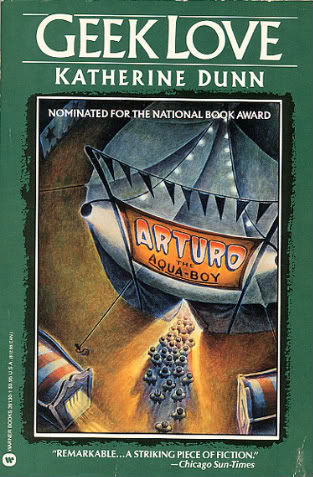 By KATHERINE DUNN (Warner Books; 1983/88/89)
By KATHERINE DUNN (Warner Books; 1983/88/89)
Here’s an object you rarely ever see: a novel with something for everybody. GEEK LOVE is an unabashedly horrific saga with enough grotesquerie to satisfy the most demanding horror buff, yet it also has the charm and erudition required to sate the literary crowd, having been nominated for the National Book Award and sporting enthusiastic blurbs from The New York Times and Publishers Weekly.
It’s the saga of the traveling Carnival family the Binewskis, seen through the eyes of the hunchbacked Olympia Binewski, who like her brothers and sisters was born a freak. Olympia’s mother Lil deliberately ingested drugs and exposed herself to harmful radiation while pregnant in order to produce sideshow attractions for the carnival. In addition to Olympia, Lil’s freakish brood includes Arturo, who has flippers in place of his arms and legs, the conjoined twins Iphy and Elly, and Chick, a boy who is initially mistaken for a hated “norm” because he doesn’t display any outward freakishness (and is nearly abandoned because of it) but is actually the most “talented” of all the Binewskis, being telepathically endowed.
The rich and ultimately tragic saga of this freaky brood makes for fascinating and compulsive reading. With a strong eye for telling detail Katherine Dunn skillfully lays out the rise of Arturo into an object of worship for countless gullible individuals, to the point that many of his followers willfully amputate their own limbs to be like their idol. Before long Artie takes over the carnival, running things according to his own selfish, and increasingly violent, whims.
Olympia is quite cognizant of Artie’s evil nature but insists on loving him to a near-incestuous degree. She’s so besotted with her brother, in fact, that she blames his degeneration on a rootless woman doctor who attaches herself to the carnival early on. In later years Olympia stalks the woman, intent on killing her for her transgressions. These modern-day sequences, in which Olympia also surreptitiously looks in on her twentyish daughter who’s unaware of her mother’s identity (I’ll refrain from revealing the unique manner in which the girl is conceived), are interspaced with Olympia’s lively recollections of her families’ fortunes.
I found Katherine Dunn’s highly florid, introverted prose off-putting at times, particularly in the present-day sections (although I’m certain it’s that very style that so charmed the literati). Still, Olympia is such a varied and complex character I won’t complain overmuch, while Dunn’s talent and enthusiasm for colorful bizarrie are second to none.
